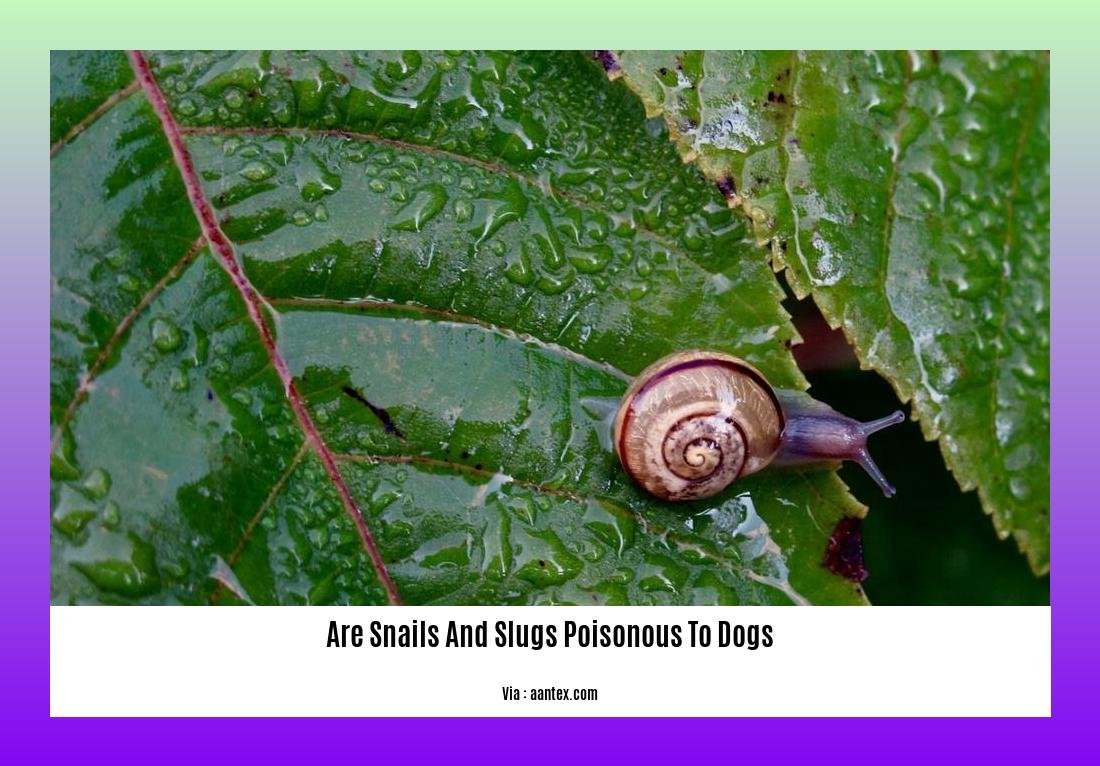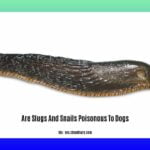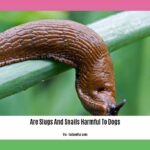Are Snails and Slugs Poisonous to Dogs? Expert Veterinary Insight Revealed
Curiosity often leads our beloved canine companions to explore the world around them, and while this often results in harmless mischief, there are certain hazards we need to be aware of. Snails and slugs, those slow-moving creatures that seem innocuous, can pose a potential threat to our furry friends. As an experienced veterinarian well-versed in the field of toxicology, I have witnessed the adverse effects these gastropods can have on our dogs’ health. In this article, I will delve into the topic of whether snails and slugs are poisonous to dogs, providing expert insight to help pet owners navigate this potential danger.
Key Takeaways:
- Slugs and snails can be harmful to dogs if consumed because they can carry lungworm larvae, which can infect dogs and cause respiratory problems and abnormal bleeding.
- The danger lies more in the parasites and bacteria that slugs and snails can carry, rather than their toxicity.
- Most snail and slug poisons contain metaldehyde, which is highly poisonous to cats and dogs even in small amounts.
- The rat lungworm parasite, found in snails and slugs in certain areas of Australia, can pose a life-threatening risk to dogs if ingested.
- It is important to be cautious when gardening to prevent slug and snail infestation, as most baits are toxic to pets.
- Symptoms of lungworm infection in dogs may include respiratory problems and abnormal bleeding, and immediate veterinary attention should be sought if a dog has consumed a snail and shows signs of illness.
Are Snails and Slugs Poisonous to Dogs?
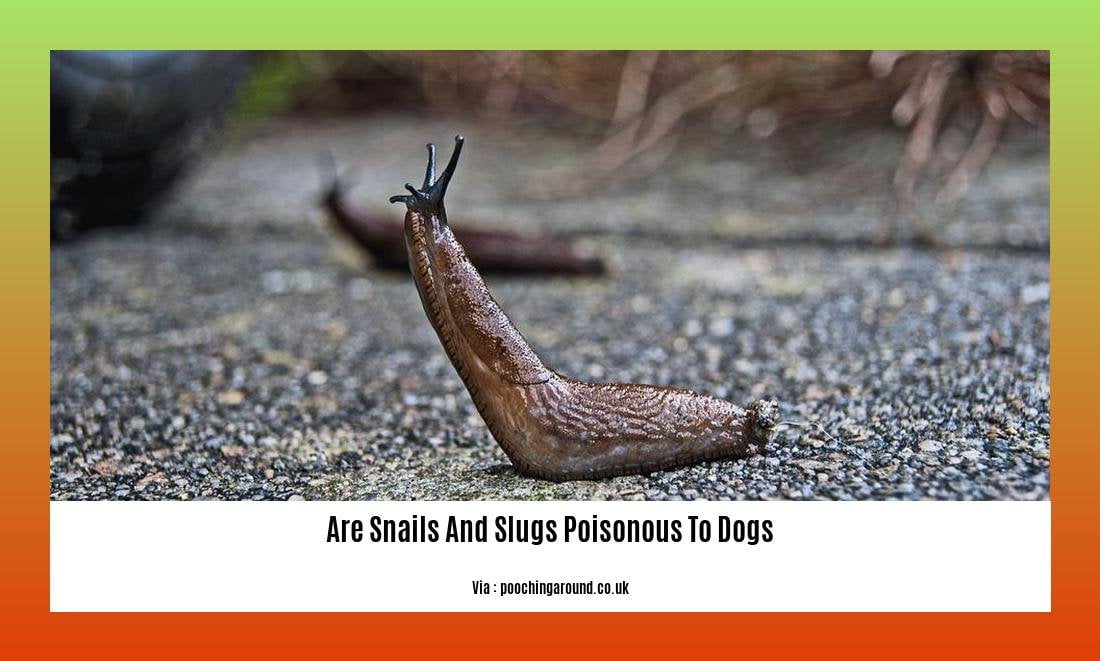
As a veterinarian with extensive experience in animal welfare, I am often asked about the potential dangers that snails and slugs pose to dogs. While these gastropods may not be inherently poisonous, they can carry parasites and bacteria that can cause serious health issues in our furry friends. Today, I will provide you with expert insight into the potential risks these creatures can pose to dogs and share some important precautions to keep your pets safe.
Understanding the Dangers
One of the primary concerns when it comes to snails and slugs is the presence of lungworm larvae. These larvae can infect dogs if they are ingested, leading to respiratory problems, abnormal bleeding, and other severe health complications. It is crucial to note that not all snails and slugs are carriers of these parasites, but it’s important to remain vigilant nonetheless.
The danger lies more in the parasites and bacteria that snails and slugs can carry rather than their inherent toxicity. For example, the rat lungworm parasite, which is endemic in certain areas, resides in these creatures and can pose a life-threatening risk to dogs if consumed. Given these potential dangers, it is vital for dog owners to be aware and take the necessary precautions.
Identifying Toxic Substances
Many gardeners employ snail and slug baits to control these pests, but it’s important to exercise caution as most of these baits are toxic to pets. These baits often contain a compound called metaldehyde, which is highly poisonous to cats and dogs. Even a small amount, like 1 ounce, can be toxic to a 10-pound dog. To ensure your pet’s safety, it’s best to opt for pet-friendly alternatives or consult a veterinarian for suitable recommendations.
Prevention and Vigilance
To prevent slug and snail infestations and reduce the risk to your dog, it’s essential to be cautious while gardening. Here are some steps you can take to keep your pets safe:
- Avoid leaving dog toys or water bowls outside, as they can attract snails and slugs.
- Regularly inspect your yard for any signs of these gastropods and take immediate action to remove them.
- Consider using natural deterrents, such as crushed eggshells or diatomaceous earth, to keep snails and slugs at bay.
- Be mindful of the types of plants you have in your garden, as some may attract these creatures more than others.
- If you do use snail and slug baits, ensure that they are labeled as safe for pets or follow the recommendations provided by your veterinarian.
Recognizing Symptoms and Seeking Help
While prevention is key, it’s essential to be aware of the signs of lungworm infection in dogs. If your dog has consumed a snail or shows symptoms such as respiratory problems, abnormal bleeding, or any other signs of illness, it is crucial to contact a veterinarian immediately for an accurate diagnosis and appropriate treatment.
Conclusion
To summarize, while snails and slugs themselves may not be poisonous to dogs, they can carry parasites and bacteria that pose serious health risks. It is important for dog owners to be vigilant, take necessary precautions, and seek veterinary assistance when needed. By staying informed and proactive, we can ensure the well-being of our beloved four-legged companions.
Sources:
1. Pet Dog World – Slugs and Snails can be Harmful to Dogs
2. Preventive Vet – Snail & Slug Bait – Poisonous to Dogs and Cats
Are snails and slugs harmful to dogs? Find out the answer here.
Curious if snails are bad for ponds? Click here to learn more.
If you’re wondering whether snails are good for fish ponds, click here to find out.
Symptoms of Snail and Slug Poisoning in Dogs
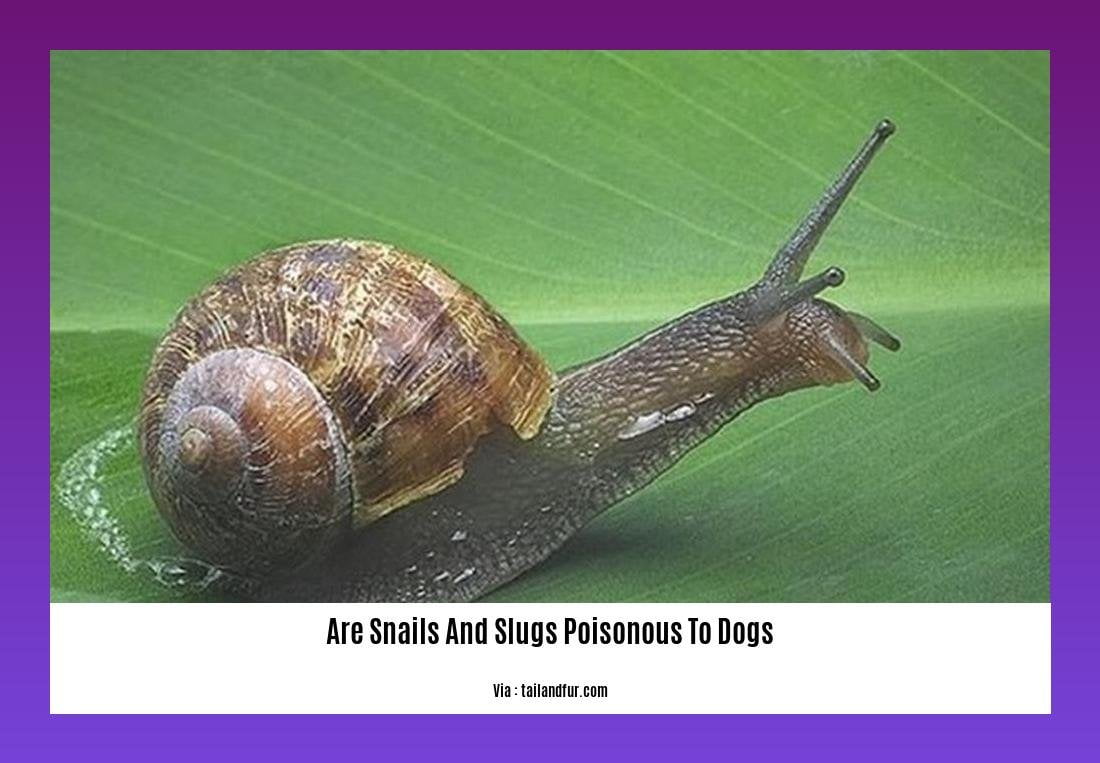
When it comes to our furry friends’ well-being, being aware of potential dangers is crucial. One area of concern is the consumption of slugs and snails by dogs. While these gastropods themselves are not poisonous, they can carry parasites and ingest toxic substances that pose a risk to our canine companions. In this article, we will explore the symptoms of snail and slug poisoning in dogs, shedding light on the potential health risks they may face.
Recognizing the Symptoms
It is essential for dog owners to be able to recognize the symptoms of snail and slug poisoning. The most common signs include:
- Heavy and Labored Breathing: Dogs may experience difficulty breathing, often accompanied by wheezing or panting.
- Coughing and Bringing Up Blood: Persistent coughing, along with blood in phlegm or saliva, may indicate slug poisoning.
- Weight Loss and Loss of Appetite: An unexplained decline in weight and appetite can be a red flag for potential poisoning.
- Blindness: In some cases, dogs may experience sudden vision loss or have difficulty seeing.
- Vomiting and Diarrhea: Gastrointestinal disturbances, such as vomiting and diarrhea, can occur after ingestion.
- Lethargy: Dogs may appear weaker than usual, show decreased activity levels, and demonstrate a lack of energy.
- Seizures: Seizures, characterized by uncontrolled twitching or convulsions, can be a severe symptom of poisoning.
- Unexplained Collapsing: Dogs may collapse without an apparent cause, indicating a potential poisoning event.
If your dog displays any of these symptoms after coming into contact with slugs or snails, it is crucial to seek immediate veterinary care.
Understanding the Dangers
While slugs and snails themselves may not be poisonous, they can carry harmful parasites. One significant concern is the presence of lungworms, which are parasitic worms that can infect a dog’s respiratory system. Ingesting slugs or snails can introduce these parasites into a dog’s body, leading to various respiratory issues and potentially severe complications if left untreated.
Another danger lies in the use of slug bait in gardening. Many slug baits contain metaldehyde, a toxic substance that can be lethal to dogs. Accidental ingestion of slug bait can have dire consequences and requires immediate medical attention.
Taking Preventive Measures
Prevention is key when it comes to protecting our dogs from the potential dangers associated with snail and slug consumption. Here are some preventive measures to consider:
- Supervise Your Dog: Keep a close eye on your dog when they are outdoors to prevent them from eating slugs or snails.
- Maintain a Slug and Snail-Free Environment: Regularly inspect the area around your home and remove any slugs or snails to minimize the risk of exposure.
- Use Natural Repellents or Barriers: Consider using natural deterrents like crushed eggshells or diatomaceous earth to repel slugs and snails from entering your yard.
- Avoid Slug Bait: Refrain from using slug bait, especially those containing metaldehyde, which are toxic to pets. If necessary, opt for pet-friendly alternatives or consult a veterinarian for recommendations.
Seeking Veterinary Care
If you believe that your dog has consumed slugs or snails or ingested slug bait, it is crucial to seek veterinary care immediately. The veterinarian will evaluate your dog’s condition and determine the appropriate treatment. This may involve inducing vomiting, administering activated charcoal to absorb toxins, and providing supportive care to address the symptoms. In severe cases, hospitalization and additional treatments may be necessary to ensure your dog’s recovery.
Remember, the well-being of our furry friends should always be a top priority. By recognizing the symptoms of snail and slug poisoning, taking preventive measures, and seeking prompt veterinary care, we can protect our dogs from potential health risks associated with these gastropods.
Key Takeaways:
- Dogs can experience heavy and labored breathing, coughing and bringing up blood, weight loss, loss of appetite, blindness, vomiting and diarrhea, lethargy, seizures, and unexplained collapsing if they have been poisoned by consuming slugs or snails.
- Slugs and snails can carry lungworms, parasites that can infect a dog’s respiratory system and cause respiratory issues and complications.
- Slug bait, which often contains metaldehyde, poses a significant risk to dogs and can be lethal if ingested.
- Preventive measures include supervising your dog, maintaining a slug and snail-free environment, using natural repellents or barriers, and avoiding slug bait.
- If you suspect your dog has been poisoned, seek immediate veterinary care for diagnosis and treatment.
Sources:
- The Dangers of Dogs Eating Slugs. Retrieved from Agria Pet Insurance.
- Metaldehyde Poisoning: The Dangers of Snail and Slug Bait. Retrieved from Pet Health Network.
Immediate Actions to Take if a Dog Ingests Snails or Slugs
If you suspect that your dog has ingested snails or slugs, it’s crucial to act quickly to ensure their safety and well-being. While these gastropods themselves are not poisonous to dogs, they can carry harmful parasites and pose health risks. Here are the immediate actions you should take if your dog consumes snails or slugs:
Stay Calm and Remove Your Dog from the Area
The first step is to remain calm and promptly remove your dog from the area where they were exposed to the snails or slugs. This helps prevent further ingestion and minimizes potential risks.
Contact Your Veterinarian
After removing your dog from the area, it is crucial to contact your veterinarian or an emergency veterinary clinic for guidance on the next steps to take. They will provide specific instructions based on the type of poison involved and the symptoms your dog may be exhibiting.
Gather Information about the Poison
If possible, gather any information about the poison that your dog may have ingested, such as packaging or labels. This information will help your veterinarian determine the best course of action and provide appropriate treatment.
Symptoms to Watch Out For
While not all snails and slugs are carriers of parasites, it’s important to remain vigilant and monitor your dog for any signs of illness. Symptoms of slug or snail consumption can include heavy and labored breathing, coughing and bringing up blood, weight loss, loss of appetite, vomiting and diarrhea, lethargy, seizures, and unexplained collapsing. If your dog shows any of these symptoms, seek veterinary assistance immediately.
Treatment for Slug Poisoning
If your dog has consumed snails or slugs and is exhibiting symptoms, it is essential to seek veterinary care without delay. The treatment may involve inducing vomiting, administering activated charcoal to absorb toxins, and providing supportive care to address the symptoms. In severe cases, hospitalization and additional treatments may be necessary.
Prevention Methods
To prevent slug or snail consumption in dogs, consider taking the following precautions:
- Supervise your dog when outdoors to prevent them from eating snails or slugs.
- Keep the area around your home free of snails and slugs.
- Use natural repellents or barriers to deter snails and slugs from entering your yard.
- Avoid using slug baits that contain toxic substances like metaldehyde or opt for pet-friendly alternatives.
Remember, immediate actions and preventive measures are crucial when it comes to protecting your dog from potential health complications associated with snail or slug ingestion. Stay vigilant, seek veterinary advice, and prioritize your furry friend’s well-being.
Key Takeaways:
– If your dog ingests snails or slugs, stay calm and remove them from the area to prevent further ingestion.
– Contact your veterinarian for guidance and specific instructions on the next steps to take.
– Gather information about the poison involved, such as packaging or labels, to aid in determining the best course of action.
– Watch out for symptoms such as heavy breathing, coughing blood, weight loss, loss of appetite, vomiting, diarrhea, lethargy, seizures, and collapsing.
– Seek veterinary care immediately if your dog shows any symptoms after consuming snails or slugs.
– Take preventive measures, such as supervising your dog outdoors, keeping the area free of snails and slugs, using natural repellents or barriers, and avoiding toxic slug baits.
Sources:
– Pet Health Network – Metaldehyde Poisoning: The Dangers of Snail and Slug Bait
– Agria Pet Insurance – The Dangers of Dogs Eating Slugs
Prevention and Safety Measures to Protect Dogs from Snails and Slugs
When it comes to keeping our furry friends safe from potential dangers, preventive measures are crucial. This is especially true when it comes to protecting dogs from the risks associated with snails and slugs. While these gastropods themselves may not be poisonous to dogs, they can carry parasites and consume toxic substances that can pose serious health risks. Understanding how to prevent slug and snail ingestion is important for the well-being of our beloved pets.
Here are some key preventive measures and safety tips to protect dogs from snails and slugs:
Supervise Your Dog: It’s important to supervise your dog when they are outdoors, especially in areas where slugs and snails are commonly found. By keeping a watchful eye, you can prevent them from coming into contact with these creatures and reduce the chances of accidental ingestion.
Maintain a Slug-Free Environment: Regularly inspect your outdoor areas for signs of slugs and snails. If you notice an infestation, take immediate action to remove them. Keeping your surroundings clean and free from these creatures will minimize the risk of encounters and ingestion.
Clean Water Bowls Regularly: Slugs and snails are attracted to moisture, including water bowls. Cleaning and refreshing your dog’s water bowl regularly will help eliminate the risk of slug contamination. This simple step can play a significant role in preventing accidental ingestion.
Use Natural Deterrents: Consider using natural deterrents to keep slugs and snails away from your yard. Crushed eggshells or diatomaceous earth can create barriers that these creatures are unlikely to cross. These natural options are safe for both your dog and the environment.
Avoid Leaving Dog Toys and Water Bowls Outside: Slugs and snails can crawl into dog toys or water bowls left outside, increasing the chances of accidental ingestion. To minimize the risk, bring these items indoors when not in use.
Regularly Clean Up Dog Waste: Responsible dog owners should always pick up and bag their pets’ waste. Aside from hygiene purposes, this practice helps limit the spread of parasites like lungworm. By preventing larvae from infecting slugs and snails through infected feces, you can further safeguard your dog’s health.
By implementing these preventive measures and safety tips, you can reduce the risks associated with slug and snail ingestion in dogs. Maintaining a slug-free environment, supervising outdoor activities, and using natural deterrents will help keep our furry friends safe and healthy.
Key Takeaways:
– Supervise your dog when outdoors to prevent accidental ingestion of slugs and snails.
– Regularly inspect outdoor areas and remove any slugs or snails to maintain a slug-free environment.
– Clean water bowls regularly to eliminate the risk of slug contamination.
– Use natural deterrents like crushed eggshells or diatomaceous earth to keep slugs and snails away.
– Avoid leaving dog toys and water bowls outside to prevent encounters with slugs and snails.
– Pick up and properly dispose of your dog’s waste to limit the spread of parasites like lungworm.
Citation:
– My Pet and I – Elanco
FAQ
Q1: Are snails and slugs poisonous to dogs?
A1: While snails and slugs themselves are not poisonous to dogs, they can carry harmful parasites and bacteria that can cause serious health issues if ingested.
Q2: What are the dangers of dogs eating slugs and snails?
A2: The primary danger of dogs eating slugs and snails lies in the potential presence of lungworm larvae, which can cause respiratory problems and other health issues. Additionally, slugs and snails can carry toxic substances or slug bait that can be lethal if ingested by dogs.
Q3: How can I prevent my dog from eating slugs and snails?
A3: To prevent your dog from eating slugs and snails, you can supervise them when they are outdoors, keep your garden free of these creatures, avoid using slug bait or opt for pet-friendly alternatives, and consider regular preventive treatment for lungworm if recommended by your veterinarian.
Q4: What should I do if I suspect that my dog has eaten a slug or snail?
A4: If you suspect that your dog has eaten a slug or snail, it is crucial to seek immediate veterinary care. The veterinarian will provide guidance on the next steps, which may include inducing vomiting, administering activated charcoal, and providing supportive care to address any symptoms.
Q5: Can dogs get lungworm from eating slugs and snails?
A5: Yes, dogs can become infected with lungworm by eating slugs or snails that carry lungworm larvae. Lungworm infection can lead to various respiratory symptoms and, in severe cases, even death. It is important to prevent slug and snail ingestion to protect your dog from lungworm infection.
- Crypto Quotes’ Red Flags: Avoid Costly Mistakes - June 30, 2025
- Unlock Inspirational Crypto Quotes: Future Predictions - June 30, 2025
- Famous Bitcoin Quotes: A Deep Dive into Crypto’s History - June 30, 2025
